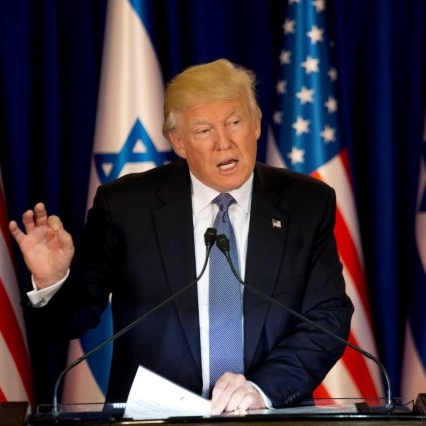
News

Donald Trump on his whistle-stop visit
PAULA SLIER
In a much-anticipated public address, Trump’s final words before departing the capital city that for two days had hosted him in an almost mini-White House (the presidential suite in the Jerusalem King David Hotel was bullet-, rocket- and poison gas-proof) were that America would always stand with Israel and that security co-operation between the two countries was better than ever.
It was arguably one of the most pro-Israel speeches ever given by an American president and within minutes the commentators were busy analysing it. Consensus seems to be that Trump played up the positive and ignored the negative.
Palestinians, naturally, are less upbeat. Officials say they sense a sincere desire in the American administration to make peace, but still did not believe (Israeli Prime Minister Benjamin) Netanyahu. By contrast, Netanyahu went on record saying it’s the first time in his life that he feels there is real hope for change. Still, the question must be asked: What, if anything, has changed?
Trump offered few details and was low on specifics. It’s one thing to say the time is right for peace, but there are as yet no concrete plans of how he plans to achieve this.
It could be that, as his aides acknowledge, his administration has yet to craft a strategy, but the time will come when Trump can no longer get away with just words. So, while most Israelis are singing his praises, it’ll be interesting to see what comes from a visit that saw the first American president visit the Western Wall while still in office.
In the run-up to Trump’s visit – and that of his 900-strong entourage – I visited a small Palestinian village, Turmusayya, in the West Bank. Most of the villagers have Palestinian and American citizenship and fly regularly to the United States for work. For them, Trump doesn’t hold much allure; if anything, their lives have become more difficult as Muslims travelling to America.
Just a stone’s throw away, 7 000 Israelis live in the settlement of Shilo – almost 10 per cent of them have American passports. As much as their Palestinian American neighbours are ambivalent in their support of Trump, these Israelis are unequivocal in their hope that he’ll be good for them.
But for all the talking Trump did in two days, there were three noticeable omissions from his speeches. He didn’t mention a one- or two-state solution like he has done previously; he kept quiet about moving the American embassy from Tel Aviv to Jerusalem; and he stayed far away from talking about Israeli settlements.
Could it be that the unpredictable president is following a script? Or could it be that in the face of so much scrutiny and pressure back home, he’s being extremely careful abroad? Still, maybe this is simply the Trump we’ve come to expect – a leader who holds the cards and never lets the other players know his next move.
Netanyahu was reportedly nervous in the run-up to Trump’s visit, not completely certain that the American president would not surprise him with a last minute unexpected statement. Palestinian Authority President Mahmoud Abbas surely also knows not to mess with Trump – he’s certainly a lot more forceful than his predecessor Barack Obama. In the final count, this might very well prove to be Trump’s biggest strength.
What was particularly symbolic about this visit is that the president chose to travel to Israel during his first overseas trip – as opposed to Obama who visited only during his second term in office.
In shoring up support against Iran (music to the ears of both Israelis and the Saudis) during the first leg of his trip to Saudi Arabia, Trump slammed Tehran for its “state-sponsored terror” and vowed the country would never become a nuclear power.
But here too, talk is (relatively) cheap and there could well be consequences further down the road for isolating Iran and its Shiite allies. Still, there’s no denying that the tough-talking Trump has left his mark. All that remains now is to see if he can succeed where so many others before him have failed.




